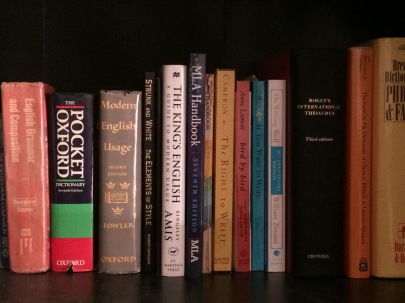
These are some references to accompany the July 27, 2016, workshop on writing which Preeti Gill and I developed for APRA’s Prospect Development 2016. This is by no means an exhaustive list, just some safe places to think about writing. Whether your work is primarily in prospect research, or in another area of fundraising, clear communications and effective writing can go a long way. These texts have your back.
Amis, Kingsley. The King’s English: A Guide to Modern Usage. New York: St. Martin’s Press, 1997. Print.
In this book, Amis often gives not only the reason for a rule, but also its history and social context. It is organized alphabetically, with paragraphs and sometimes pages about commonly misused or misunderstood words, phrases, and concepts. The blurb on this book jacket describes Kingsley Amis as “one of the most important figures in postwar British fiction.” I will admit, however, that I have many more books on my shelves by Amis’ son Martin than I do of his.
Cameron, Julia. The Right to Write: An Invitation and Initiation into the Writing Life. New York: Penguin Putnam, 1998. Print.
Julia Cameron is a novelist, playwright, poet, and writing teacher. The Right to Write follows a simple model over 42 chapters. First, Cameron issues an “invitation” by discussing a common barrier to writing. She follows that with an “initiation” which consists of concrete writing exercises and tools to give the writer practice in overcoming specific obstacles. While her examples may seem very specific, she always returns to her broader purpose of getting people to integrate writing into their daily lives.
Fowler, H.W. A Dictionary of Modern English Usage. Rev. Sir Ernest Gowers. 2nd ed. 1965. Oxford: Oxford University Press, 1985. Print.
I inherited this book from my parents; the original edition was published in 1926. Like the Amis book, for which it served as a model, it is organized dictionary-style. However, there are more pages and the print is tinier, the content is more extensive and exhaustive, the entries often briefer, and the emphasis is much more on the usage of individual words. Fowler, a translator, writer, and former teacher, was a proponent of proper English, and his rules and explanations reveal that bias. Sir Ernest Gowers, a civil servant, hated the jargon he encountered in government. As part of his advocacy for clear language, Gowers undertook the first major revision of Fowler’s book, updating it for the 1960s.
Lamott, Anne. Bird by Bird: Some Instructions on Writing and Life. New York: Doubleday, 1994. Print.
Of all the resources on this list, this may be the most fun to read. Anne Lamott is a novelist and columnist. You may already know that she got the title for this book from some advice her father gave her brother as he was working on a last minute paper about birds. Her brother was facing down the writers’ block which procrastination often brings, and their father told him, “bird by bird, buddy. Just take it bird by bird.” This is what Lamott does here with the writing process, giving us as a result both a memoir and honest advice for aspiring writers. Sometimes it is brutally honest advice, ranging from committing to producing “shitty first drafts” to coping with the 27 bad reviews she received for one of her novels.
Orwell, George. “Politics and the English Language.” 1946. Resources for Graduate Students. University of Texas-Dallas, Sept. 2000. Web. June 30, 2016. <https://www.utdallas.edu/~aria/research/resources/orwell.pdf>
I only just discovered this essay on Twitter in the last few weeks. Written just after World War II, this often tongue-in-cheek examination of political writing resonates just as much today. The lessons here could benefit any persuasive writer, politician or not.
Strunk, William Jr. and E.B. White, The Elements of Style. 1959. 50th anniversary ed. New York: Pearson Longman, 2009. Print.
Without question, a classic. This brief but comprehensive guide to English language grammar, usage, and style is organized by topic. To help you find what you are looking for, it offers a detailed table of contents, and includes both a glossary and index. I especially appreciate their advocacy for the serial, or Oxford, comma, which comes on page two of my edition.
Swift, Jonathan. “On Poetry: A Rhapsody.” 1733. The Literature Network. 2000-2016. Web. June 30, 2016. <http://www.online-literature.com/swift/3515/>
Jonathan Swift was one of the English language’s greatest satirists, and this very long poem skewers pretensions about both poetry and political writing. It was written several years after the more well-known essay “A Modest Proposal” and Gulliver’s Travels.
Ueland, Brenda. If You Want to Write: A Book About Art, Independence and Spirit. 1938. 2nd ed. Saint Paul: Graywolf Press, 1987. Print.
For many years, Brenda Ueland taught a writing class at the Minneapolis YMCA. She was the daughter of a lawyer and a suffragette, and worked as a writer and editor. Much of the book consists of stories about famous artists, the aspiring writers from her classes, and her own experiences, and it is a pleasure to read. She compares the writing process to stringing beads on a necklace, and eschews writing for money or fame. Family friend, Carl Sandberg, called this book “the best book ever written about how to write.”
Zinsser, William. On Writing Well: The Classic Guide to Writing Nonfiction. 1976. 30th anniversary ed. New York, HarperCollins, 2006. Print.
William Zinsser advocates for simple, clear, and honest prose. He offers advice for removing clutter from writing through reducing adjectives and adverbs, and using (not utilizing) the simplest word choices. He abhors clichés, jargon, and corporate speech. If you need to write a long piece of technical writing, this book will be your ally. Zinsser has written 17 books and countless newspaper and magazine articles, and has taught at Yale, Columbia School of Journalism, and the New School.

